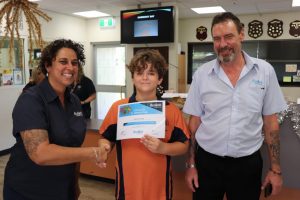With every CDC journey, whether it is for work or play, we foster mobility, connectivity and inclusion. We take pride in serving and supporting the local communities in all geographies that we operate. We foster an environment of trust by engaging the communities we serve and contributing in every way that we can.
Across Australia, we partner with like-minded organisations that are passionate in giving back to the communities and supporting those in need. We support our partners through collaborations and awareness campaigns as well as financial assistance for projects that promote diversity and social inclusion, youth empowerment and leadership, wellbeing, security and sustainability.

Making A Difference Through Partnerships
CDC partners with Western Chances, an organisation that gives underprivileged but talented young people in Melbourne’s west a chance to realise their potential through merit-based, tailor-made scholarships and opportunity programs, including work placement with CDC. CDC also contributes by providing yearly MYKI travel passes for students requiring financial assistance.
Since 2014, we have been in partnership with Western Bulldogs Community Foundation in Melbourne’s west which focuses on youth leadership and development. CDC has been an active sponsor of their Youth Leadership programs, working closely together to promote model behaviours and leadership through youth engagement. CDC has also partnered with Western Bulldogs Community Foundation in the past to deliver anti-graffiti workshops with the aim of reducing antisocial behaviour and restoring respects. Today, CDC supports the Western Bulldogs Nallei Jerring program which empowers First Nations young people through leadership development.

Aboriginal & Torres Straits Islander Partnerships
Contributing to First Nations reconciliation is a significant priority for CDC. For full details, please see our Reconciliation Action Plan.
Our relationships with both the Clontarf and Stars Foundations are important to us, enabling us to contribute and support young Aboriginal and Torres Strait Islander men and women respectively.
Our major partner, the Clontarf Foundation, seeks to improve the education, discipline, life skills, self-esteem and employment prospects of young Aboriginal and Torres Strait Islander men.
CDC also provides depot visits and school safety talks to the Stars Foundation which supports Aboriginal and Torres Strait Islander girls to improve health and education outcomes by conducting training such as road safety training.
We have also built a close relationship with the Larrakia Nation Aboriginal Corporation in the Northern Territory and support many of their community initiatives. Larrakia Nation has been invaluable in helping us raise cultural awareness within our organisation.
In Victoria, through our partnership with AFL team the Western Bulldogs, we support the Nallei Jerring community foundation which aims toeducate, empower and engage young Aboriginal and Torres Strait Islander participants living in the West.
We are also continuing to support the work of the Baabayn Aboriginal Corporation, including transporting participants to and from the Elders Olympics, believed to be the largest gathering of Elders in New South Wales.
Baabayn Elders’ participation at important events to celebrate First Nations culture,. such as NAIDOC week and National Reconciliation Week, our staff and the broader community benefit from a platform for First Nations voices to be heard and the sharing of cultural experiences.

Working with Local Communities
In Darwin, our team has a long history of proactive engagement with the local communities.
Community engagement is a pillar that CDC invests in to benefit the local communities with the long-term goal of restoring respect to bus drivers.
In line with this initiative, we have launched a school education program that aims to teach children about the importance of mutual respect and behaviour on public transport. By helping kids understand the importance of mutual respect, over time we hope to reduce the incidence of anti-social behaviour towards our drivers and commuters, creating safer public transport.
CDC also partners with the Werribee Football Club in Melbourne’s west to deliver the School Champions Day, an initiative for local students to experience leadership and teamwork through sports. Our community relationships also enhance community inclusion and participation. CDC’s partnership with the Western Sydney Wanderers football club provides local students transport to the Wanderers’ after school program, enabling their access to facilities and coaching that would otherwise be inaccessible. As part of the partnership, the Wanderers also support CDC with recruitment initiatives to drive employment opportunities for Wanderers members and fans. Our buses also shuttle fans to interstate and away games, boosting fan engagement.

Sustainability Partnerships
CDC is focused on environmental sustainability. We value partnerships with stakeholders such as Parks Victoria, through which we have contributed to a range of initiatives including Australia’s first Dementia Friendly Forest and Sensory Trail at Woowookarung Regional Park and a special Sensory Garden at Serendip Sanctuary in Lara, an initiative by Parks Victoria aimed at fostering a deeper connection between people and nature.
CDC also works with several partners to help deliver greener vehicle options. With these partners, CDC has established Australia’s largest hybrid bus fleet and operates 8 electric buses on routes throughout Melbourne. We are also a foundation partner of VIVA Energy’s hydrogen refuelling station at their VIVA Energy Hub in Geelong, the first publicly available hydrogen station in Australia – and we are looking forward to contributing to a more sustainable future by operating two hydrogen buses later in 2025 which will be refuelled at the Energy Hub.
More details on CDC’s Community Engagement are available in the video below.
